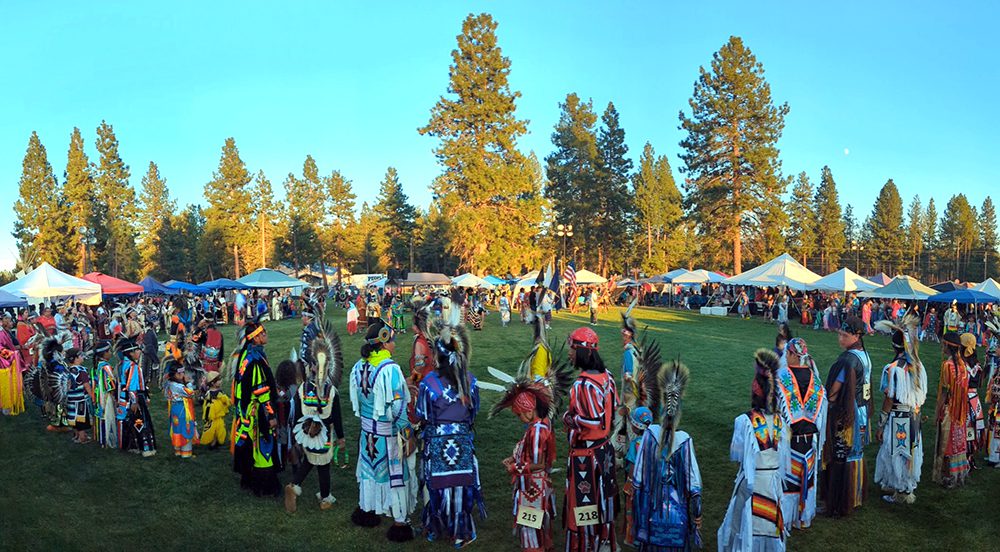Honoring Native American Heritage
/ NOVEMBER 7, 2024 /
Photo credit – Juliette Jackson, Klamath Tribes
Many Native cultures revere water as a sacred, living entity. They are deeply connected to water sources, seeing themselves as stewards, not just users. For millennia, Indigenous peoples have tended to our waterways, understanding its deep connection to life itself. The Lakota phrase “Mni Wiconi” translates to “water is life”, which emphasizes the fundamental importance of water. For many Indigenous groups, water holds memory and shows generosity in its ability to sustain all living things. Despite this long-held spiritual belief and cornerstone to their way of life, native nations have historically been excluded from investments in modern water and sanitation systems.
The Reservoir Center is celebrating Native American Heritage Month this November. This month honors the rich history, diverse cultures, and significant contributions of Native American and Alaska Native peoples and recognizes the enduring legacy of Indigenous peoples and their deep connection to the land.
According to Tribal Clean Water, 48% of tribal homes do not have access to reliable water sources, clean drinking water, or basic sanitation. Recent federal investments in tribal water infrastructure and reliability have started the process of breaking down historical barriers and ensuring native communities have access to this basic need, but there’s still a long way to go to ensure that all native communities have access to clean water.
Our partners are united through their dedication to advance progress towards clean water access and up-to-date water infrastructure for all communities. Discover how our partners empower native communities.
Coastal States Organization: Investing in the Future of The Great Lakes
The Great Lakes region holds significant cultural and historical importance for Indigenous communities. Coastal States Organization is leading a project alongside the NOAA Office for Coastal Management (Great Lakes Region), Great Lakes Coastal Zone Management programs, and a variety of federal, state, local and tribal partners to develop habitat restoration in the Great Lakes. Each year, three to four nature-based habitat restoration projects are designed, with equitable co-benefits at its core. Since 2020, they have worked with partners along twelve sites in the Great Lakes coastal watershed to develop engineering and design blueprints for habitat restoration.
Engineers Without Borders: Fusing Tradition and Technology
Through working side-by-side with Indigenous communities to develop infrastructure projects, Engineers Without Borders (EWB) is able to combine traditional knowledge with modern engineering practices to improve access to water, energy, sanitation, and transportation. In Arizona, EWB partnered with the University of Arizona chapter and the Nalwoodi Denzhone Community (NDC) of the San Carlos Apache Tribe to promote the cultivation of traditional crops and improve water infrastructure. EWB prioritizes traditional knowledge from Indigenous communities to strengthen the long-term sustainability and self-sufficiency of these communities.
Dig Deep: Expanding Accessible Water Access in Navajo Communities
Spanning across 27,000 miles in New Mexico, Utah, and Arizona, the Navajo Nation is larger than ten U.S. states. However, 30% of Navajo families still don’t have a sink or a toilet, and about 1 in 3 Navajo families haul water home every day. Dig Deep’s Navajo Water Project helps bring hot and cold running water to homes without access to water or sewer lines, through installing off-grid and solar powered home water systems. In addition, the project, which is Indigenous-led and is registered as an official enterprise of the Navajo Nation, invests in more effective septic systems and skilled job creation.
Moonshot Missions: A Collaborative Approach to Water Security
Forty percent of residents of the Bodaway Gap Chapter of the Navajo Nation lack access to potable water in their homes. Our partner, Moonshot Missions, provided a treated water filling station for better access to water for rural residents.
Discover how to effectively engage with Indigenous communities from Lionel Puhuyesva, a Senior Utility Advisor at Moonshot and a member of the Hopi Tribe here.
American Rivers: Advancing Indigenous Water Rights
From protecting the Delaware River with the Lenape people to advocating for tribal river protections in the Wild and Scenic Rivers Act, American Rivers understands the importance of clean, healthy watersheds for Indigenous communities. By understanding Indigenous origin stories, colonial history, and existing water infrastructure, such as dams and hydropower projects, we can work towards equitable access to clean water for Indigenous communities and strengthen their connection to ancestral waterways.
The Reservoir Center is dedicated to building a world where everyone has access to clean water and water-based experiences are accessible to all. This month and every day, let’s learn from Indigenous communities and care for our water systems and planet with sustainable ideals at the forefront.
